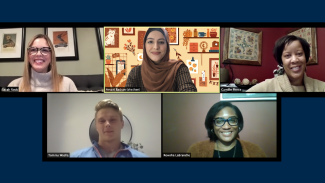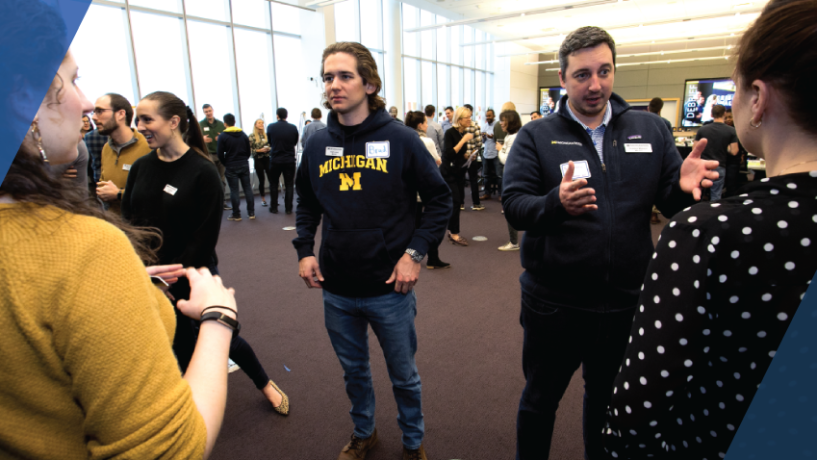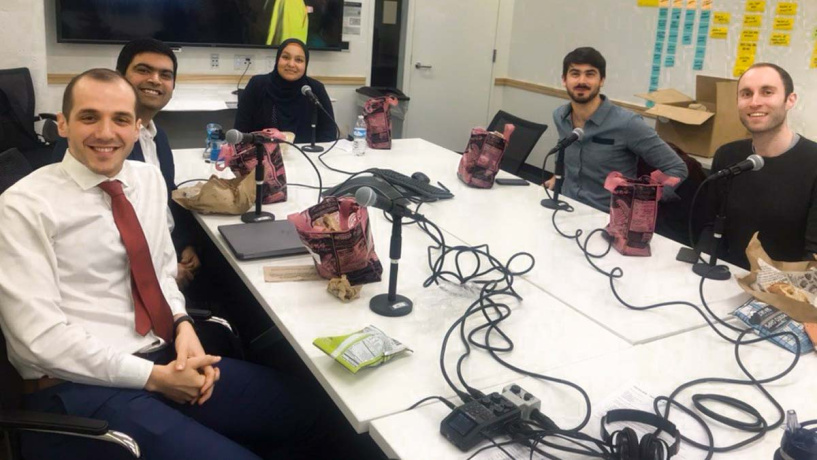First-Ever DEI Case Competition Organized By Michigan Ross Part-Time MBA Students Highlights Importance of Diversity in the Workplace

After creating strategic recommendations to increase diversity, equity, and inclusion at a multinational beauty company, a team of four Weekend MBA students at the Ross School of Business were declared the winners of an inaugural Part-Time MBA DEI Case Competition organized by Part-Time MBA Executive Board members.
Those students - Jake Supron, WMBA2, Alisha Punjabi, WMBA2, Mara Wittmann, WMBA2, and Mike Dobmeier, WMBA2 - competed against five other teams of students from Weekend, Online, and Evening MBA Programs during the case competition in December. Representatives from Google, McKinsey, EY, and Campell’s Soup volunteered as judges.
Amani Badran, WMBA2, vice president of diversity and inclusion of the Part-Time MBA Executive Board, said there were a number of important reasons why they decided to organize the first DEI Case Competition for part-time students.
Many students participate in case competitions across campus to challenge themselves in applying learnings from course material to real-world problems or crisis situations. We saw this approach as a great way to accomplish our goal, giving students an opportunity to take on a DEI challenge as professionals/consultants, working on diverse teams to brainstorm creative solutions and apply long-term strategies.
Badran added that a case competition about DEI seemed fitting because the participants are able to showcase DEI concepts and apply them in real-life solutions.
“As part-time MBA students, we have an advantage because we’re in the workplace,” she said. “We have firsthand experience in corporate America. We are able to see DEI in the workplace and on campus and are able to share our ideas.”
Using an existing case, teams were tasked with developing a strategy and framework for both the long-term and short-term regarding diversity efforts for a global company. Students had to consider how to get buy-in from company stakeholders by evaluating five diversity considerations: recruitment and integration, management, communication, training, and career management.
Tommy Wydra, MBA ’19 and McKinsey associate, shared why he wanted to judge the case competition.
“I’m passionate about helping part-time students who are driven enough to take time out of their busy schedules to think about critical issues like this,” said Wydra. “It would have been easy for them to say, ‘Not this time; I have enough going on with work, school, and family.’ However, they volunteered their time to learn about and try to solve a very difficult issue, so I wanted to support them in doing that.”
Members of the winning student team said that they wanted to participate in the case competition for an opportunity to gain more perspective on DEI in organizations and to work with their peers. That includes Punjabi, who is an engineer in supplier quality at Ford Motor Company.
“Participating in the DEI case competition was an opportunity for me to further my learning process with peers who have the same commitment and drive to create sustainable change,” said Punjabi. “On a personal level, as a woman of color it is important for me to have this dialogue and think critically with others who have a range of experiences, enabling open communication and consideration of DEI in our education, our jobs, and our daily lives.”
Utilizing teamwork and Ross learnings to win
To win, Dobmeier said they drew from each other’s personal and professional experiences and were able to utilize many principles they learned during courses at Michigan Ross for the case competition.
“It was a team effort - lots of brainstorming and drawing from personal experiences my teammates and I have had related to culture/DEI initiatives at our own organizations, plus some research on industry leaders in the DEI space,” explained Dobmeier, a construction project coordinator for the University of Michigan’s College of Engineering.
In addition, he explained they were able to draw a large part of their solution from Dr. Raffi Indjejikian's Strategic Cost Management course and his teaching into the three-legged stool for organizational performance - consisting of decision rights, reward systems, and performance evaluation - to align a firm's mission with the actions it makes related to its employees.
That whole organization evaluation is a key reason why Supron believes they were able to win the competition. “I think the judges selected us because we had a clear message that considered how to create change at all levels of the organization,” he said.
Growing the competition and DEI at Ross
Looking into the future, Punjabi said she is excited to see the Part-Time MBA DEI Case Competition continue to grow in the coming years.
I am proud to be part of a program that is committed to DEI. Ross is continuously improving DEI – most recently diversifying its leadership, expanding the curriculum and creating courses focused on DEI, and launching speaker series focused on race and business. This DEI case competition is a great example of how Ross is encouraging students to take part in these discussions and be a part of the change the school is committed to.







